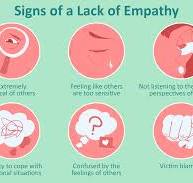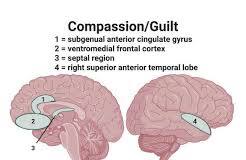The Relationship Between Borderline Personality Disorder and Empathy
Borderline Personality Disorder (BPD) is a complex mental health condition that affects how a person thinks, feels, and relates to others. One common misconception about individuals with BPD is that they lack empathy. However, this assumption oversimplifies the relationship between BPD and empathy.
Empathy in Individuals with BPD
While it is true that some individuals with BPD may struggle with expressing empathy in certain situations, it is important to understand the underlying factors that contribute to this behaviour. People with BPD often experience intense emotional states and have difficulty regulating their emotions, which can make it challenging for them to empathise with others effectively.
Additionally, individuals with BPD may have a heightened sensitivity to perceived rejection or abandonment, leading them to respond defensively or emotionally in interactions with others. This can create barriers to empathetic communication and understanding.
Treatment and Support
It is crucial to recognise that empathy is not a fixed trait but a skill that can be developed and nurtured over time. Therapy, such as dialectical behaviour therapy (DBT), can help individuals with BPD learn how to regulate their emotions, improve their interpersonal skills, and enhance their capacity for empathy.
Supportive relationships and a non-judgmental environment are also essential for individuals with BPD to feel safe and understood. By fostering a sense of acceptance and validation, those struggling with BPD can begin to cultivate more empathetic responses in their interactions with others.
Breaking Stereotypes
It is important to challenge stereotypes and stigmas surrounding mental health conditions like BPD. By promoting education and understanding, we can create a more compassionate society that recognises the complexities of individual experiences.
Empathy is a fundamental aspect of human connection, and by fostering empathy towards those affected by BPD, we can create a more inclusive and supportive community for all.
Exploring the Benefits of Understanding Empathy in Borderline Personality Disorder (BPD)
- Increased awareness of the complexities of Borderline Personality Disorder (BPD)
- Opportunity to challenge misconceptions and stereotypes about empathy and BPD
- Promotion of empathy-building strategies for individuals with BPD
- Encouragement of supportive and non-judgmental environments for those with BPD
- Advancement in therapy techniques, such as dialectical behaviour therapy (DBT), to enhance empathy skills
- Development of a more compassionate society through understanding mental health challenges
- Creation of a platform for open dialogue on the interplay between BPD and empathetic responses
Challenges of Borderline Personality Disorder: Navigating Perceptions and Relationships Amidst Empathy Struggles
- Misunderstanding and judgement from others due to perceived lack of empathy.
- Difficulty forming and maintaining close relationships due to challenges in empathetic communication.
- Increased feelings of isolation and loneliness resulting from a lack of perceived empathy towards others.
- Strained interpersonal dynamics with family, friends, and colleagues due to difficulties in understanding and responding to emotional cues.
- Limited support networks as a result of struggles with expressing empathy effectively.
Increased awareness of the complexities of Borderline Personality Disorder (BPD)
An important pro of the misconception that individuals with Borderline Personality Disorder (BPD) lack empathy is that it highlights the need for increased awareness and understanding of the complexities of this mental health condition. By exploring and debunking such misconceptions, we can shed light on the multifaceted nature of BPD and the challenges faced by those living with it. This increased awareness can lead to more compassionate and informed support systems, as well as improved strategies for addressing the unique needs of individuals with BPD.Ultimately, it paves the way for a more empathetic and inclusive approach to mental health care.
Opportunity to challenge misconceptions and stereotypes about empathy and BPD
An intriguing aspect of the misconception that individuals with Borderline Personality Disorder lack empathy is the opportunity it presents to challenge prevailing stereotypes and misconceptions about both empathy and BPD. By delving deeper into the complexities of this issue, we can foster a more nuanced understanding of how emotional dysregulation and intense emotional states in individuals with BPD may impact their ability to express empathy effectively. This exploration not only sheds light on the unique challenges faced by those with BPD but also encourages us to reevaluate our perceptions of empathy and mental health, ultimately fostering greater empathy and compassion within society.
Promotion of empathy-building strategies for individuals with BPD
A notable advantage of addressing the issue of perceived lack of empathy in individuals with Borderline Personality Disorder (BPD) is the promotion of empathy-building strategies tailored to their specific needs. By recognising the challenges faced by individuals with BPD in empathetic interactions, targeted interventions can be developed to help them enhance their capacity for empathy. Through therapy and support systems that focus on emotional regulation and interpersonal skills development, individuals with BPD can learn effective strategies to navigate complex social situations and cultivate a deeper understanding of others’ emotions and perspectives. This proactive approach not only benefits those with BPD but also contributes to fostering more empathetic and inclusive relationships within society as a whole.
Encouragement of supportive and non-judgmental environments for those with BPD
One significant advantage of the misconception that individuals with Borderline Personality Disorder (BPD) lack empathy is the encouragement it brings towards creating supportive and non-judgmental environments for those with BPD. By recognising the need for understanding and acceptance, individuals with BPD are more likely to receive the compassionate care and empathy they require to navigate their emotional challenges effectively. This shift in perspective promotes a culture of inclusivity and support, fostering a sense of safety and validation that is essential for individuals with BPD to feel heard and understood in their journey towards healing and growth.
Advancement in therapy techniques, such as dialectical behaviour therapy (DBT), to enhance empathy skills
Advancements in therapy techniques, such as dialectical behaviour therapy (DBT), have shown promise in enhancing empathy skills among individuals with Borderline Personality Disorder (BPD). DBT focuses on teaching emotional regulation, interpersonal effectiveness, and distress tolerance, which are essential components for developing empathy. By providing individuals with BPD the tools and strategies to better understand and manage their emotions, DBT can help them cultivate a deeper sense of empathy towards others. This targeted approach not only benefits the individual’s mental well-being but also contributes to building more meaningful and empathetic relationships within their social circles.
Development of a more compassionate society through understanding mental health challenges
Understanding the complexities of Borderline Personality Disorder (BPD) and the associated challenges with empathy can lead to the development of a more compassionate society. By raising awareness and promoting education about mental health conditions like BPD, we can foster a culture of empathy and understanding towards individuals who may struggle with emotional regulation and interpersonal relationships. This increased awareness not only benefits those directly affected by BPD but also helps create a more inclusive and supportive environment for everyone, ultimately contributing to a society that values compassion and empathy in all interactions.
Creation of a platform for open dialogue on the interplay between BPD and empathetic responses
The potential benefit of understanding the relationship between Borderline Personality Disorder (BPD) and empathetic responses lies in the creation of a platform for open dialogue. By exploring how individuals with BPD may struggle with expressing empathy due to their emotional challenges, we can foster discussions that delve into the complexities of this interplay. Such dialogue can help increase awareness, promote empathy towards those affected by BPD, and encourage a more nuanced understanding of how individuals with this condition navigate their relationships and interactions with others.
Misunderstanding and judgement from others due to perceived lack of empathy.
Misunderstanding and judgement from others can be a significant con of the misconception that individuals with Borderline Personality Disorder lack empathy. This misperception can lead to stigmatisation and alienation of those with BPD, as they may be unfairly judged for their perceived inability to empathise with others. Such misunderstandings can create barriers to meaningful relationships and support systems, further isolating individuals who are already grappling with the challenges of managing their emotions and interpersonal interactions. It is crucial for society to move beyond stereotypes and misconceptions about BPD to foster a more empathetic and inclusive environment for all individuals, regardless of their mental health condition.
Difficulty forming and maintaining close relationships due to challenges in empathetic communication.
Individuals with Borderline Personality Disorder (BPD) often face the con of struggling to form and sustain close relationships due to difficulties in empathetic communication. The intense emotional fluctuations and challenges in regulating emotions that are characteristic of BPD can hinder their ability to connect with others on a deep and understanding level. This can lead to misunderstandings, conflicts, and a sense of isolation, making it hard for individuals with BPD to establish the trust and emotional intimacy necessary for lasting relationships. Seeking support and therapy that focuses on improving interpersonal skills and enhancing empathy can be crucial in overcoming these obstacles and building healthier connections with others.
Increased feelings of isolation and loneliness resulting from a lack of perceived empathy towards others.
Individuals with Borderline Personality Disorder (BPD) who struggle with expressing empathy may experience heightened feelings of isolation and loneliness as a consequence of their perceived inability to connect with others emotionally. The challenges in understanding and responding empathetically to the feelings and experiences of those around them can lead to a sense of disconnection and alienation, exacerbating the already intense emotional turmoil that often accompanies BPD. This increased sense of isolation can further impact one’s mental well-being and interpersonal relationships, highlighting the importance of addressing empathy deficits in individuals with BPD through therapeutic interventions and supportive environments.
Strained interpersonal dynamics with family, friends, and colleagues due to difficulties in understanding and responding to emotional cues.
Individuals with Borderline Personality Disorder (BPD) may experience strained interpersonal dynamics with family, friends, and colleagues as a result of difficulties in understanding and responding to emotional cues. The challenges in regulating emotions and interpreting social signals can lead to misunderstandings and conflicts in relationships. This lack of empathy or difficulty in empathetic responses can create barriers to effective communication and connection with others, impacting the quality of interactions and contributing to feelings of isolation and alienation for individuals with BPD.
Limited support networks as a result of struggles with expressing empathy effectively.
Individuals with Borderline Personality Disorder (BPD) may face the con of limited support networks due to their struggles with expressing empathy effectively. The challenges that individuals with BPD experience in regulating their emotions and understanding the emotions of others can create barriers in forming and maintaining relationships. This difficulty in empathising with others can lead to misunderstandings, conflicts, and a sense of isolation, ultimately affecting the quality and depth of their support networks. It is important for individuals with BPD to receive understanding and patience from those around them as they work towards developing their empathy skills through therapy and support systems.



